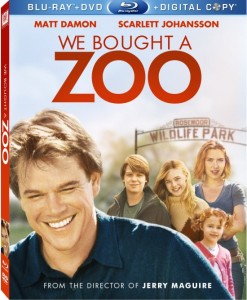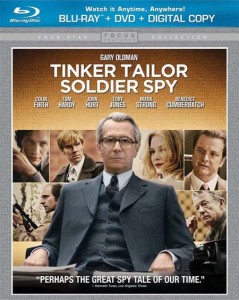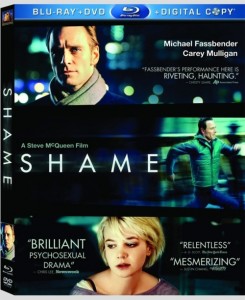Last winter, as with every awards season, some of the best acted films were released in theaters, one for the masses, one for the high brow, and one for those daring enough buy a ticket to an NC-17 film.
 We Bought A Zoo seems like the kind of sappy family crap that big movie stars make to appease their young children and earn a quick buck. However, Zoo had Cameron Crowe behind the camera, so I was hoping he’d regained some his form after the last two fiction films he directed, Vanilla Sky and Elizabethtown. Moreover, Crowe’s leading man was Matt Damon, one of the most appealing movie stars alive. From Good Will Hunting to The Talented Mr. Ripley; the Bourne films to Stuck On You, Damon has proven time and again that he can take any material and elevate whatever he’s given. Zoo is no exception. Whereas the film should have been one of those overbearing family films I mentioned, he makes it work.
We Bought A Zoo seems like the kind of sappy family crap that big movie stars make to appease their young children and earn a quick buck. However, Zoo had Cameron Crowe behind the camera, so I was hoping he’d regained some his form after the last two fiction films he directed, Vanilla Sky and Elizabethtown. Moreover, Crowe’s leading man was Matt Damon, one of the most appealing movie stars alive. From Good Will Hunting to The Talented Mr. Ripley; the Bourne films to Stuck On You, Damon has proven time and again that he can take any material and elevate whatever he’s given. Zoo is no exception. Whereas the film should have been one of those overbearing family films I mentioned, he makes it work.
His character is Benjamin, a widower father raising Dylan (Colin Ford), his teenage son and Rosie (Maggie Elizabeth Jones- so cute), his seven-year-old daughter. Desperate for a change of pace and an escape from the everyday reminders of his wife, Damon goes house hunting and finds a beautiful, two story place with rolling hills and fresh country air. But there’s a catch. Yes, it’s a zoo. Instead of fleeing, like any sane person would do, Damon decides to take on this challenge, wild animals and zoo staff included. Crowe’s writing is light and breezy, this isn’t Jerry Maguire or Almost Famous territory (although Famous lead, Patrick Fugit, has a supporting role), but the director is having fun. Scarlett Johansson co-stars as the smart, all business leader of the eclectic zoo staff and she provides some romantic interest for Benjamin, even though both acknowledge that the ghost of his wife is too ever present for anything to really happen.
The movie features several nice supporting turns by the likes of Thomas Haden Church, Elle Fanning and JB Smoove, but the main attraction is Damon, who has such a natural way in front of the camera that makes a movie as inconsequential as We Bought A Zoo is so much better. I wanted to hate this movie, but Damon is so good that I wound up enjoying it just as much as my children. As with all of Cameron Crowe’s home video releases, the Blu-ray is jammed full of extra content. Bonus material includes commentary by the director, a behind the scenes featurette and extended and deleted scenes. I’d say that this film is a return to form for the director in terms of character and spirit. I look forward to his return to the world of grown-ups to see what he comes up with next. Perhaps he’ll draft Matt Damon for his next project. If he does, that movie will already be on my must see list.
 2011 should go down as the year of the silent actor. There were Ryan Gosling’s practically mute performance in Drive and Jean Dujardin’s Academy Award winning work in The Artist. And then there was Tinker, Tailor, Soldier, Spy and Gary Oldman’s impeccable acting as John LeCarre’s most famous character, George Smiley. A lot was made of Oldman having to fill the big shoes of Sir Alec Guinness, who played Smiley in two classic TV mini-series. Oldman makes the role his own, though, bringing to it all of the expressive empathy we’ve seen him deliver in the Harry Potter and Batman films, and the intensity he’s brought to, oh, just about everything he’s done starting with Sid and Nancy.
2011 should go down as the year of the silent actor. There were Ryan Gosling’s practically mute performance in Drive and Jean Dujardin’s Academy Award winning work in The Artist. And then there was Tinker, Tailor, Soldier, Spy and Gary Oldman’s impeccable acting as John LeCarre’s most famous character, George Smiley. A lot was made of Oldman having to fill the big shoes of Sir Alec Guinness, who played Smiley in two classic TV mini-series. Oldman makes the role his own, though, bringing to it all of the expressive empathy we’ve seen him deliver in the Harry Potter and Batman films, and the intensity he’s brought to, oh, just about everything he’s done starting with Sid and Nancy.
The question of this movie wasn’t whether Oldman and his exemplary supporting cast would deliver the goods. The roll call of actors is a dream for any director: Colin Firth, Toby Jones, John Hurt, Mark Strong and Tom Hardy. Instead, the question I had was how screenwriters Bridget O’Connor and Peter Straughan would mold LeCarre’s dense Cold War thriller into a two hour movie -the Guinness mini-series was six hours long. From a narrative point of view, the screenwriters did an excellent job of selecting the meatiest portions of the book and placing them in the 1970’s time era movie. Unlike the mini-series, which featured 20-30 minute flashback sequences, the same material is handled in dialogue. This allows for some riveting scenery chewing by some of the finest actors in the world. Director Tomas Alfredson (who also helmed the superb, Let the Right One In) and his cinematographer Hoyte van Hoytema designed stunning visual imagery that complements every element of the film, including Alberto Iglesias jazzy score.
I’m not going to lie, Tinker, Tailor requires an attentive mind when watching it. Not a word or an expression from Oldman wasted in this film. So much about the plot is in the details and if you get distracted you may miss something. Fortunately, with a Blu-ray, you can rewind, or rewatch the movie multiple times. Unfortunately, the purposelessly slower pace sometimes makes the film feel like homework rather than entertainment. However, I believe the payoff is worth it and Oldman’s performance will reward you in the long run.
 Much of the press relating to writer/director Steve McQueen’s film, Shame, was over its NC-17 rating and its graphic sexual nature. I feel that the hype drove away people from this powerful film. Did Shame deserve its scarlet letters and numbers? By MPAA standards, sure. Michael Fassbender letting it all hang out was enough to give the ratings police the willies. I suppose McQueen could have altered his opening scene to include Fassbender’s character, Brandon, in whitie tighties, but it would have been pointless. A sequence near the end of the movie, in which Fassbender’s character goes on a sex binge, includes a scene at an underground gay sex club (and we all know how homosexual sex between men makes the MPAA squirm), plus a threesome between Fassbender and two women with a quick shot of the actor burying his face in a woman’s ass. Other than those scenes, which in the context of the movie actually make sense, the sex in Shame is as raunchy as The Hangover or an American Pie, movie. Meaning, I’m not sure what the fuss was all about.
Much of the press relating to writer/director Steve McQueen’s film, Shame, was over its NC-17 rating and its graphic sexual nature. I feel that the hype drove away people from this powerful film. Did Shame deserve its scarlet letters and numbers? By MPAA standards, sure. Michael Fassbender letting it all hang out was enough to give the ratings police the willies. I suppose McQueen could have altered his opening scene to include Fassbender’s character, Brandon, in whitie tighties, but it would have been pointless. A sequence near the end of the movie, in which Fassbender’s character goes on a sex binge, includes a scene at an underground gay sex club (and we all know how homosexual sex between men makes the MPAA squirm), plus a threesome between Fassbender and two women with a quick shot of the actor burying his face in a woman’s ass. Other than those scenes, which in the context of the movie actually make sense, the sex in Shame is as raunchy as The Hangover or an American Pie, movie. Meaning, I’m not sure what the fuss was all about.
What you have here is a sad story of a man who’s created a perfect, meticulous bubble to serve his addiction. At work he manages to conceal the stash of digital porn he keeps on his PC and he’s so esteemed as an employee that he easily lies his way out of trouble when it’s discovered. When he’s really stressed, he rushes to the bathroom to masturbate, making it appear as if he’s using the stall for something else. On the subway or in the pricey restaurants that he frequents Brandon has just the right look or phrase to get women into his bed, the back of a car or up against the grimy cement posts of an underpass. At home he has a personal relationship with the Internet porn star whose site he subscribes to and he has a steady flow of prostitutes who come through he front door whenever he needs them. Brandon’s controlled world begins to unravel when his younger sister, Sissy, shows up on his doorstep to crash on his couch. Her arrival cock blocks Brandon’s existence. As she begins to uncover his addiction, Brandon must comes to terms with what it’s doing to his life.
Sissy is a mess. A singer by trade, she has no home, suffers from depression and cuts herself to deal with whatever dark past she shares with her sibling (at one point she says, “We’re not bad people, we just come from a bad place.”). McQueen leaves their childhood a mystery. Sissy wants nothing more than to connect with her big brother, but all she does is fuck up his life. She’s one of those types who leaves the open milk carton out, lets dirty dishes pile up and drops her coat on the floor whenever she enters a room. She has a total disregard for the pristine environment that she’s invading. Carey Mulligan, the actress who seemed to come out of nowhere with her performance in 2009’s An Education, gives a strong, tortured performance as Sissy. Together with her excellent work in Drive, 2011 turned out to be a banner year for the actress, who at only 26 is quickly becoming one of the brightest stars of her generation.
Using New York City as its backdrop, Shame is a slick film that embraces the sexiness and allure of the Big Apple. McQueen’s film follows the through line of many addiction films, including the aforementioned binge sequence that occurs when Brandon is spiraling downward. Although the film is overly sad, I never found the movie downright depressing like the very bleak Requiem for a Dream or Leaving Las Vegas. I credit this to Fassbender’s touching performance. Behind his eyes you see a man trying to push through the darkness in his soul. In the end there is a glimmer of hope. Technically and creatively, Shame is one of the best films I saw from 2011. If you can get past the naughty bits, I think you may agree.





Comments